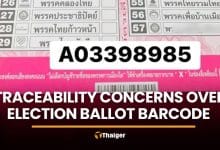EC urges Senate candidates to behave as final voting day nears

The Election Commission (EC) issued a stern warning to Senate election candidates regarding adherence to regulations as the final phase of voting takes place today. Some 2,995 candidates, who cleared the provincial-level selection process on June 16, are competing for 200 seats at Mueang Thong Thani in Nonthaburi. The official results will be announced on July 2.
EC Secretary-General Sawaeng Boonmee stated that the commission is vigilant and closely monitoring all candidates’ activities.
Several candidates are lodging in the same hotels. On Monday, election officials conducted random inspections at some of these hotels and found nothing untoward.
According to Sawaeng, the candidates were merely exchanging opinions and introducing themselves to one another. He noted that these inspection visits are designed to prevent any breaches of election laws.
However, Sawaeng cautioned that if evidence emerges of candidates violating rules or engaging in vote-buying, the EC will launch an investigation and potentially refer the case to the Supreme Court.
“If the candidates are found guilty, the EC will issue red, orange, or black cards, each carrying specific penalties for violations.”
Penalties
A red card will disqualify candidates found guilty of electoral fraud. An orange card will suspend the election rights of a winning candidate for one year if there is evidence of their involvement in fraud. A black card will revoke their election rights for life, said Sawaeng.
“Before issuing these penalties, the EC must present investigation reports and evidence to the Supreme Court.”
He clarified that vote exchanging in the Senate election is no longer considered a breach of regulations.
This remark came in response to questions about whether candidates are permitted to encourage others to vote for them or promise to swap votes.
Following a petition against the EC’s initial restrictions on campaigning, the Administrative Court ruled against the EC’s restrictions on May 24, leading to their repeal.
Sawaeng mentioned that since the regulation preventing candidates from publicly introducing themselves was scrapped due to the court ruling, candidates can now use their votes as they wish, except for buying votes, which remains illegal.
Foreign representatives
Additionally, the EC met with representatives from foreign embassies and international organisations yesterday to brief them on the election process, as they will be allowed to observe the voting.
The Senate election began with over 45,000 candidates divided into 20 professional groups. The three-phase process required candidates to select among themselves, both from their group and other groups, at the district, provincial, and national levels.
At the district level, the five candidates with the most votes in each group advanced to an inter-group election. Following this, the three candidates with the most votes from each group were shortlisted, resulting in 60 candidates across 20 groups.
This process was repeated at the provincial level on June 16. However, in the inter-group poll at this stage, only the two candidates with the most votes proceeded to the national stage, where the top ten from each of the 20 groups will be selected as senators today, reported Bangkok Post.
Latest Thailand News
Follow The Thaiger on Google News:


























